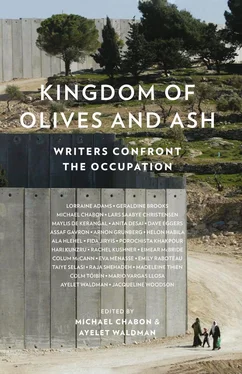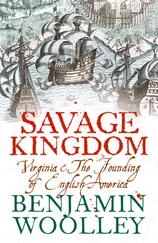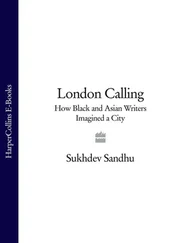But in this explosive case, privacy didn’t seem respected by either side. A few weeks later, Palestinian television screened a lengthy video of Ahmed’s interrogation. It remains unclear who leaked it. Ahmed sat hunched at a corner of a desk in what appeared to be an Israeli police station, surrounded by three plainclothes officers. The lead interrogator, a brawny man with sunglasses pushed back on top of his knitted kippa , attempted to extract a confession to two counts of attempted murder.
At first, as the interrogator screamed in Arabic and waved his finger in Ahmed’s face, the boy repeatedly hit his injured head.
“I swear by God I can’t remember,” he whimpered.
“You swear by God? Who is this shit God?” Looming over the boy, the interrogator demanded to know why he helped his cousin.
“I don’t know,” Ahmed cried, once again hitting at his head. “Take me to the doctor.”
“Shut up!” yelled the interrogator. “Sit up straight. Put your hands down!”
The film as aired had been edited, so it is impossible to know how long all this went on. But in the end, the boy was sobbing convulsively. “Everything you say is true!” he wailed. “Just stop!”
Since the Manasras live on the Israeli side of the separation barrier, Ahmed Manasra was tried in a civil court rather than under the military justice system, where the conviction rate is 99.74 percent. In Israeli courts, no minor under the age of fourteen at the time of conviction may be sent to prison.
But it was evident from the outset that Ahmed’s case would strain public opinion regarding the protections extended to him. Minors are required to have a parent or an attorney present during questioning. But Ahmed did not. In fact, his parents had difficulty even finding an attorney both qualified and prepared to take his case to trial. One lawyer agreed, and then called the next day to apologize, saying he’d been warned that the case would be a career ender for him. The family finally chose Leah Tsemel, a veteran civil rights attorney who has practiced in Israel’s civil and military courts for over forty-five years.
Tsemel is an Israeli-born Jew whose parents migrated to Israel from Russia and Poland in the 1930s. Raised in Haifa, she served in the army and was studying at university when the Six-Day War broke out, threatening Israel’s survival. During intense fighting in East Jerusalem, she volunteered with the army, evacuating Jewish civilians from the most threatened neighborhoods. When combat was over, the soldiers took her to the newly occupied territory of the West Bank, the biblical lands of Judea and Samaria that had been off limits to Jews during the years of Jordanian rule. The trip was supposed to be a reward, a treat. But the sight of columns of Palestinian refugees trudging down the roadside sickened her, evoking her parents’ stories of European persecutions and the resonance of the homeless, wandering Jew. She was, she said, “naive and apolitical” at that time. “I thought it was a war for peace, that we would use the victory to make peace with our neighbors.” Instead, she soon realized that what she had witnessed was the beginning of occupation, and that even key leaders in the Labor Party had no intention of giving back the land. So, she embraced the far left, and when she graduated from law school went to work in defense of Palestinians. “What I am doing is in Israel’s interest,” she asserts, “even if Israelis don’t realize it.”
Na’or’s mother, Ruti Ben Ezra, is one such Israeli. “Some people will do anything for money, even sell their soul to the devil,” she says. “I hope her own children will be injured or killed by a terrorist.”
Even though Na’or has recovered physically, his parents say his mental scars are far from healed. “The street is his worst enemy,” says his father, Shai, a forty-six-year-old electrician. He says Na’or can’t concentrate at school. His temper has become explosive. “Everything bothers him. He and his brother fight much more than they used to. Orlev feels guilty he ran away and didn’t help his brother.” Shai has had to give up his job because he needs to be with Na’or night and day. He opens his hands in a gesture of helplessness. “We are crushed,” he says.
Ruti, a kindergarten assistant, also has stopped working, afraid to leave her children alone. Two days after the attack on Na’or, her youngest child, age seven, took a knife to school. “The teacher called to tell me,” recalls Ruti. “I didn’t see. I didn’t see that he’d taken it. A seven-year-old shouldn’t have to be so afraid.” And she, too, lives with fear. “Every time I hear a siren, I think, ‘Where are my children?’ In this, they succeeded,” she says. “They want us to be afraid. I’m afraid.”
And that, Ahmed Manasra told his lawyer, Leah Tsemel, when he was finally allowed to see her, was indeed what he had intended. “His cousin said, ‘Let’s go scare them, as they scare us.’ The maximum they intended was to wound. That was the scenario, as they saw it.” Tacitly acknowledging how implausible this version will seem, she shrugs. “They are children,” she says. “But what they did understand, even as children: lifting a knife, they’d probably be killed.”
Ahmed told Tsemel that Hassan had proclaimed he was ready to die, to join the so-called martyrs whose tattered portraits peel off the walls of many Palestinian buildings. But Ahmed says he didn’t feel that way at all. He can’t say why he went along with his older cousin, but once he saw the blood of the first victim, he was terrified. As that man outran them, he saw Hassan glance towards a woman with children. He told Tsemel that he cried out: “Don’t even look at her!” Then Hassan spotted Na’or coming out of the candy store on his bicycle and moved in on him. Ahmed told Tsemel that he cried out “ Haram !”—the Arabic word for something unholy, forbidden—“We decided not to!” But Hassan stabbed the boy anyway. Bystanders and storekeepers rushed them, and within a minute or two Hassan was shot dead and Ahmed was bleeding on the tram tracks.
Before Ahmed first appeared in court, he faced a difficult choice. Since he was below the age of criminal responsibility, if he pled guilty to attempted murder at his first hearing, the case would be closed and he could not be sent to prison. But had this happened, Tsemel believed, the Israeli outcry would have been such that the law would have been changed. “They would have found a way to detain him,” she asserts. In any case, Ahmed’s family would not allow a guilty plea. He had not touched either of the victims in the attacks. Forensics confirmed that his knife had not been used, and he maintained that he never had intent to kill. So Tsemel took the case to trial, knowing that on January 20, 2016, Ahmed’s fourteenth birthday, his protections as a minor would expire. He would be sentenced as an adult and face up to twenty years in prison. As Ahmed was brought, handcuffed, into the courthouse for the first day of his trial, two other Palestinian cousins, aged fourteen and twelve, from Beit Hanina and the nearby Shuafat refugee camp, stabbed and wounded an Israeli security guard. Media reports began to refer to the wave of violence as “the children’s intifada.”
“The children are doing it because the older ones don’t do it. That’s the feeling,” says Tsemel. “If the adults acted—if only there was some political movement—they would not feel this way.”
During the trial, Tsemel argued that no Jewish boy in the same circumstances would be charged with attempted murder for attacking Arabs on nationalistic grounds. “They will always face a lesser charge—manslaughter, grievous bodily harm,” she said. Settlers who injure Palestinians often are released from custody on payment of a small fine.
Читать дальше











